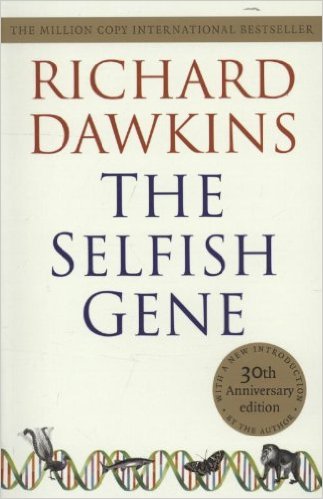His peers consider him to be the ultimate Darwinist. A gifted writer, he is also known for his original thinking on evolutionary theory. He is a creative force in the field and that differs from “popularizing” and “reporting”—writing a book that explains the existing orthodoxy so that people can understand it. He is not, to use Ezra Pound’s phrase, “a village explainer.” He is a creative: he changes people’s minds.
He is known and respected for inventing telling metaphors that illuminate the Darwinian debate: In The Selfish Gene, he argues that genes—molecules of DNA—are the fundamental units of natural selection, the "replicators." Organisms, including ourselves, are "vehicles," the packaging for "replicators." The success or failure of replicators is based on their ability to build successful vehicles. There is a complementarity in the relationship: vehicles propagate their replicators, not themselves; replicators make vehicles.
In The Extended Phenotype, he goes beyond the body to the family, the social group, the architecture, the environment that animals create, and sees these as part of the phenotype—the embodiment of the genes. He also takes a Darwinian view of culture, exemplified in his invention of the "meme," the unit of cultural inheritance; memes are essentially ideas, and they, too, are operated on by natural selection.
Dawkins, by building on the work of John Maynard Smith, William Hamilton, George C. Williams, Robert Trivers, and by adding and incorporating his own original, ingenious, and mind-bending ideas, has revolutionized the way we think about science and redefined the role of the public intellectual in western culture. It's not just about science: it's who we are, how we are, and even, how we think. In fact, he won’t even claim credit for the idea of the selfish gene. “I simply thought that way of looking at things was an imaginative, vivid way of presenting standard Darwinism. It was a new and different way of seeing it,” he has noted.
No one has done more to sell the set of Darwinian ideas than Dawkins by having developed the rhetoric of it. In the face of his powerful notions, the '50s “Freud, Marx, and Modernism” crowd are finished. Retreating to the margins are those scientists engaged in disciplines that rely on studying social actions and human cultures independent from their biological foundation. The scientific study of human nature is now on stage, and Richard Dawkins is at the center of the action.
"The illumination of Dawkins' incisive thinking on the intellectual world,” writes philosopher Daniel C. Dennett, “extends far beyond biology. What a treat to see so clearly how matter and meaning fit together, from fiction to philosophy to molecular biology, all in one unified vision!"
According to cognitive scientist Steven Pinker, "the significance of Dawkins' ideas, for me and many others, runs to his characterization of the very nature of life and to a theme that runs throughout his writings: the possibility of deep commonalities between life and mind."
"Notions like Selfish Genes, memes, and extended phenotypes are powerful and exciting,” says computer scientist and inventor W. Daniel Hillis. “They make me think differently. Unfortunately, I spend a lot of time arguing against people who have over-interpreted these ideas. They're too easily misunderstood as explaining more than they do. So you see, this Dawkins is a dangerous guy. Like Marx. Or Darwin."
Let me end with a modest and, perhaps more telling anecdote.
About a decade ago, I conducted an interview in Vienna with the distinguished Austrian mathematician and game theorist Karl Sigmund.
“Karl, how did you become the great Karl Sigmund?” I asked. “Like everyone else,” he responded without hesitation, “I read The Selfish Gene by Richard Dawkins.”
John Brockman
New York City
January 13, 2016
[EDITOR'S NOTE: For a taste of Richard Dawkins 40 years later, I recommend “This Is My Vision of Life: A Conversation with Richard Dawkins," which was recently videotaped at noon on a Saturday at New College Cambridge, accompanied throughout by the New College church bells. —JB]



